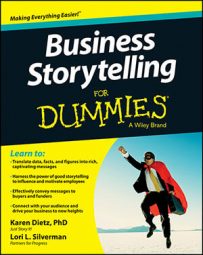The good news is, everyone has success stories to tell (and most businesses do, too). These appear to be the most prevalent type of stories found in hip pockets. Quite often success stories are authored as profiles or testimonials rather than stories. Many of them don’t have the heightened level of impact that they could.
Personal success stories
Here’s an example:
The year 2008 was filled with milestones for Rena Huber. It marked the year of her 50th birthday, the year her husband Jack turned 65, and the year of their 25th wedding anniversary.
To celebrate and renew their wedding vows, they embarked on a three-week cruise to Bermuda, then across the Atlantic to places like France, Spain, and Rome, before returning to the U.S. On this trip, Jack told her, “When you turn 55, we’re taking an around-the-world trip.” Little had Rena known this was an item on Jack’s bucket list.
For Rena 2009 began with changes at work. And she saw friends losing their jobs and their homes. Rena took stock of what was around her.
Although she wasn’t on meds like so many of their friends, nor was she regularly traipsing off to the doctor like several of them, she knew it was just a matter of time before her lifelong weight issue spawned a problem like diabetes. She also knew some changes were needed if they were going to take an extended round-the-world cruise.
Three years and nine months before her 55th birthday, she asked herself, “Have I done everything I could do to optimize my options and choices?” The answer: “I need to make a lifestyle change.” This triggered two immediate shifts: adding strength, flexibility, and cardio exercises to her already active schedule and what Rena affectionately calls decrap and declutter.
Because she wanted to have options and choices at age 55, she went a step further and researched a variety of diets, which eventually helped her lose 95 pounds naturally over a period of nine months, under medical supervision.
Never having thought she could do that, she asked herself, “What else is have I been thinking I could never do?” That sparked running. Not just ordinary running. Running half-marathons all across the country. Her first was at Disneyland in Anaheim in 2010. For her, it’s about the inner satisfaction. “People tell me I’m grinning from ear-to-ear as I run. It’s addictive,” she says.
Rena is now thinking about taking on full marathons. Why? “My last mile is always my strongest mile. I now wonder, ‘What else am I holding back?’ I’m obviously not depleted at the end of a race.”
In her dual roles as the Director of the AAAME Program (the APS Academy for the Advancement of Small, Minority- and Women-Owned Enterprises) at APS and the President of the Greater Phoenix SCORE Chapter in Phoenix, Arizona, Rena shares her story in women’s mentoring groups, with SCORE volunteers, and with business owners to help them set goals, remove limitations, and become inspired to be more than they think they are.
Not all successes in life are planned. Nor is success defined only by monetary gain. This means you need to think more broadly in your personal life about what success means. What are some ways to identify personal success stories that would add value if told in the workplace? Try reflecting on these story prompts:
Share with me a memory about a time when as a child (or teenager or adult) you achieved a major personal success that was unexpected.
Tell me about a time when you set out to do something as a child (or teenager or adult) and you found success beyond your wildest dreams.
Enlighten me about a time in your personal life when you stumbled into a wildly successful situation.
Tell me about a time when you consciously decided to become successful at something and, beyond all odds, reached your goal.
Where might these stories be useful at work? Are there situations where your colleagues or teammates believe that success is out of reach? What about circumstances where people need a motivation boost? Are you coaching or mentoring someone who needs to be inspired?
Organizational success stories
To obtain good organizational success stories, carefully nurture and craft them within your organization and its supply chain and then give them voice. If done well, sharing these stories will help these same individuals become more passionate about what they do and strengthen their relationship to your enterprise.
Every time someone leaves for another job or retires, you lose valuable experience. Sharing employee success stories —not just what they did but how they did it—facilitates knowledge transfer and acknowledgment of the success. Success stories help staff perform better and respond more quickly and effectively when they encounter a similar situation.
How do you unearth success stories in your enterprise?
If you’re an entrepreneur: Talk to your customers. Pull the stories out of them by saying, “Tell me about a significant success you were able to achieve with the assistance that you received.”
If you have customers, members, patients, clients, and so on: Draw out testimonials and thank yous and turn them into success stories. You may need to re-contact these individuals for more input.
If your organization has been around for several years: Go back into the archives and search for past successes that no one is talking about anymore. Craft stories around them and make them visible. They may be just the spark that’s needed internally to motivate a stalled team and externally to boost sales.
If you have long-tenured employees: Have them tell you about a memorable success that they helped create. Or a situation that was highly successful that didn’t get enough air time. Or about a rock star employee who sparked a significant business success.
If you have sales professionals: Ask for their favorite success stories — the ones that turn prospects into buyers.

